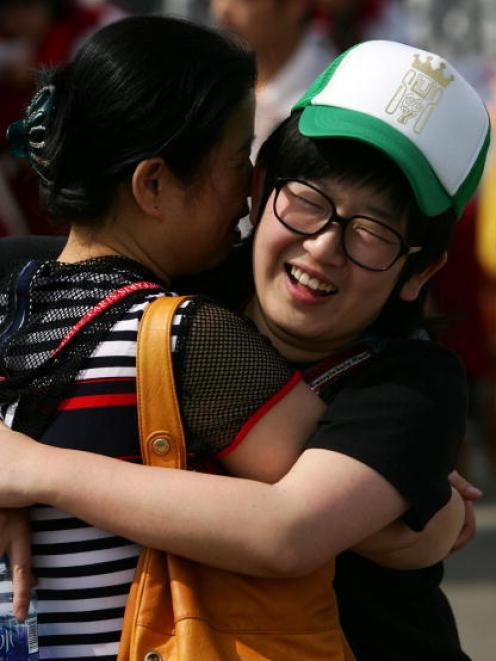
Kids are even required to study virtuous examples of those who kept this ancient faith, but in today's ever busier, competitive China, getting ahead often means leaving behind home and tradition.
This week, China's omnipresent state put into effect its solution: Let parents sue their ungrateful offspring.
The legal avenue is included in a revised version of the Law on Protection of the Rights and Interests of Elderly People, which instructs that "family members who live apart from their parents should often visit or send regards to their parents."
One mother did not wait long for justice. A Mrs. Chu, 77, convinced a court in the eastern city of Wuxi to order her daughter to compensate her financially and also visit her once every two months (and at least two public holidays per year), reported the state-owned China News service.
The revised law was greeted by ridicule and criticism by Chinese Internet users. After all, how does one determine just how often is often enough for visits, and the law contains no specific punishment for being a bad offspring.
Still, some experts welcomed the revised law.
"In the past, just a few people treated their parents badly, but now there's a large group of Chinese who are un-filial," said Xia Xueluan, professor of social studies at Peking University. "So it's necessary to legislate to protect the rights of the elderly and promote moral integrity."
In earlier decades, when society under the Communist state was more regulated, state-run "work units" and neighborhood committees could hector people into proper behavior, Xia said. But family privacy is more highly prized today among ordinary Chinese.
Part of the problem is the distorting effect of China's "one-child policy" on a modernizing society whose 194 million citizens over age 60 have few progeny to rely on for aid and comfort in their declining years.
A son or daughter may have to provide material assistance to parents and grandparents who can no longer work, and do so without contribution from siblings. They are also the only one that the elders are pining to see on holidays.
Making visits harder is China's rush to urbanization, which has put huge distances between families. Hundreds of millions of Chinese have moved to cities for work, leaving parents behind in the countryside. Xia suggests China must push companies rather than children to allow employees enough vacation time to visit their parents.
"I think it's necessary to make old people happier, but not in the form of a law," said Zhang Xuebin, 35, a Beijing civil servant who visits his parents each weekend.
Zhang says he is saddened by the loss of traditional morality, but, "The government could set up good moral examples, or use other, softer ways."
Retiree Song Xiaoguang said most Chinese parents won't blame their kids for not visiting.
"Sometimes a call is enough, as young people have their own difficulties," she said.
Song, 70, saw her son sporadically while she was at her home in central Shanxi province and he worked in Beijing. He eventually earned enough to buy the house where she joined him a decade ago.
"If my son's too busy to take care of me, I prefer a retirement home, it doesn't matter. But I'll be happier to live with him until I die," Song said.
In recent years more sons and daughters have placed their parents in retirement homes because the children are too busy to provide regular care or visits, said Wang Yan of the Jiade retirement home in east Beijing. But China has a shortage of housing for seniors outside their family homes, so the law may help, Wang said.
"In our home, some seniors lack both visits and calls. No matter how carefully we look after them, they still need their children's love," she said. "I think this is a moral not legal question."












